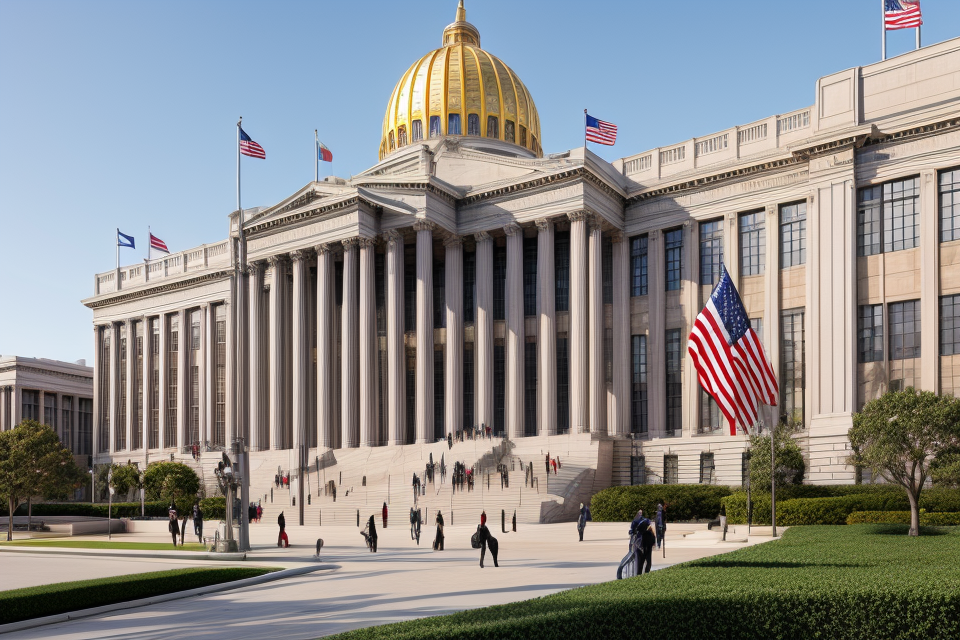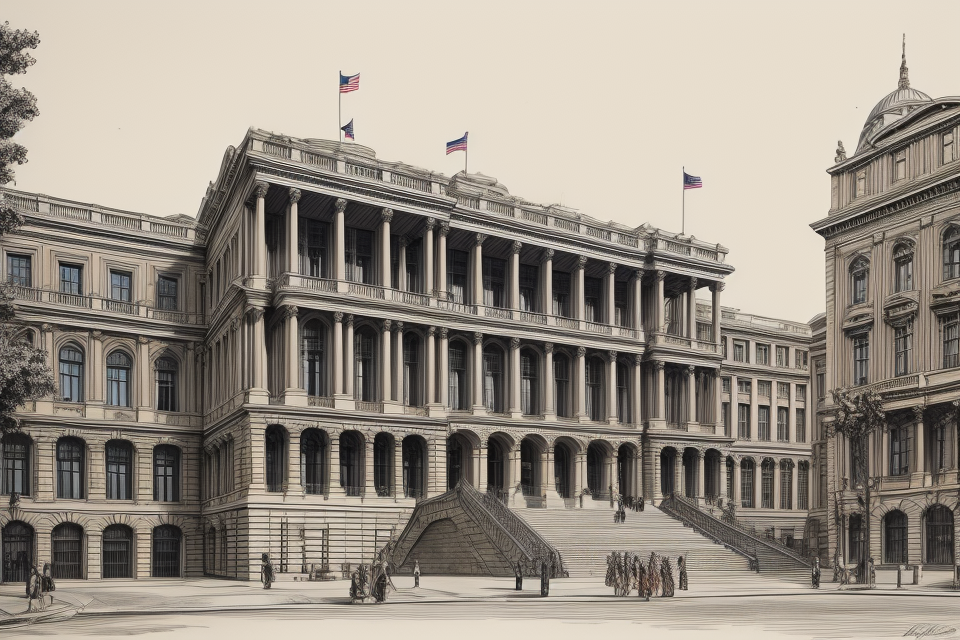US embassies and consulates are diplomatic missions that serve as a bridge between the United States government and foreign governments. They play a crucial role in promoting international relations, facilitating trade and commerce, and providing assistance to US citizens abroad. Embassies are located in the capital city of a foreign country, while consulates are located in other cities or regions. This guide will provide a comprehensive understanding of the role and function of US embassies and consulates, including their history, organization, and daily operations.
What is a US Embassy or Consulate?
Definition and Purpose
US embassies and consulates are the official representative offices of the United States government located in foreign countries. Their primary purpose is to maintain and strengthen diplomatic relations between the US and the host country, as well as to provide services and assistance to American citizens living or traveling abroad.
The establishment of diplomatic relations between countries is crucial for maintaining peace, security, and cooperation on a global scale. US embassies and consulates play a vital role in fostering these relationships by serving as a point of contact for the host country’s government, promoting economic and cultural exchange, and facilitating communication between the two nations.
Additionally, US embassies and consulates offer a range of services to American citizens, including passport and visa issuance, notarization, and assistance in case of emergencies or crises. These services are essential for ensuring the safety and well-being of American citizens while they are abroad.
Differences between Embassies and Consulates
Definition of Embassies and Consulates
An embassy is a diplomatic mission that represents the government of one country in another country. An embassy is typically located in the capital city of the host country and is headed by an ambassador. A consulate, on the other hand, is a diplomatic mission that represents the government of one country in a different city or region of the same country. A consulate is typically headed by a consul general.
Key Differences between Embassies and Consulates
One key difference between embassies and consulates is their purpose. An embassy is responsible for maintaining diplomatic relations between two countries and promoting the interests of the sending country in the host country. A consulate, on the other hand, is responsible for providing services to citizens of the sending country who are living or traveling in the host country.
Another difference between embassies and consulates is their scope of operations. An embassy is typically responsible for representing the government of the sending country in all matters, including political, economic, and cultural affairs. A consulate, on the other hand, is typically responsible for providing services such as issuing visas, providing assistance to citizens, and promoting trade and investment between the sending and host countries.
Examples of When to Use Each
Embassies are typically used when the sending country has significant political or economic interests in the host country. For example, the United States has embassies in major cities around the world, such as London, Paris, and Tokyo, to promote diplomatic relations and economic interests.
Consulates, on the other hand, are typically used when the sending country has a significant population of citizens living or traveling in the host country. For example, the United States has consulates in many cities around the world, such as Cancun, Mexico City, and Rio de Janeiro, to provide services to American citizens who are living or traveling in those areas.
US Embassies
Structure and Functions
Overview of the Structure of a US Embassy
A US embassy is a diplomatic mission that represents the United States government in a foreign country. It is headed by an ambassador, who is the official representative of the US president. The embassy staff includes a variety of personnel, including diplomats, administrative staff, and security personnel.
Explanation of the Various Functions Performed by an Embassy
The primary function of a US embassy is to maintain diplomatic relations between the United States and the host country. This includes promoting mutual understanding and cooperation, as well as representing the interests of the United States and its citizens. Embassies also provide a range of services to US citizens, including passport and visa services, and assistance in emergencies.
In addition to these core functions, embassies also play a role in promoting economic and cultural ties between the United States and the host country. They may provide information about US business opportunities and encourage trade and investment, as well as organizing cultural events and educational exchanges.
Role of Ambassadors and Other Embassy Staff
The ambassador is the head of the embassy and is responsible for representing the United States government and promoting relations between the two countries. They are assisted by a range of other embassy staff, including diplomats who are responsible for maintaining relations with the host government and other diplomatic missions, as well as administrative staff who provide support for the embassy’s operations. Security personnel are also present to ensure the safety and security of the embassy and its staff.
Types of Services Provided
US embassies are responsible for providing a range of services to American citizens, foreign nationals, and other individuals seeking assistance. These services are designed to facilitate international travel, provide support to Americans abroad, and promote economic and cultural exchange between the United States and other countries. The following are some of the types of services provided by US embassies:
Consular Services
Consular services are provided to American citizens who are traveling or living abroad. These services include the issuance of passports, the replacement of lost or stolen passports, and the provision of emergency financial assistance to Americans in need. In addition, consular officers can provide assistance with legal and medical issues, as well as provide information on local customs and laws.
Notarial Services
Notarial services are provided to American citizens and foreign nationals who need to have documents authenticated or notarized. This may include documents such as birth certificates, marriage certificates, and powers of attorney. Notaries public at US embassies can also provide oaths and affirmations, and can witness the signing of important documents.
Passport Services
Passport services are provided to American citizens who need to obtain or renew their passports. This includes the submission of passport applications, the payment of fees, and the collection of processed passports. US embassies may also offer passport photos services to those who need them.
Visa Services
Visa services are provided to foreign nationals who wish to enter the United States for business, tourism, study, or other purposes. These services include the issuance of nonimmigrant visas, immigrant visas, and other types of visas. Visa application procedures, fees, and requirements may vary depending on the type of visa and the individual’s circumstances.
Examples of US Embassies
- List of Notable US Embassies Around the World
- United States Embassy in Berlin, Germany
- United States Embassy in Beijing, China
- United States Embassy in London, United Kingdom
- United States Embassy in Moscow, Russia
- United States Embassy in Paris, France
- United States Embassy in Tokyo, Japan
- Brief Overview of Each Embassy and Its Location
- The United States Embassy in Berlin is located in the city’s Tiergarten district and is responsible for providing diplomatic services to Germany and several other European countries.
- The United States Embassy in Beijing is located in the Chaoyang District and is responsible for providing diplomatic services to China and Mongolia.
- The United States Embassy in London is located in the city’s Grosvenor Square and is responsible for providing diplomatic services to the United Kingdom and several other European countries.
- The United States Embassy in Moscow is located in the Presnensky District and is responsible for providing diplomatic services to Russia and several other countries in the region.
- The United States Embassy in Paris is located in the city’s 7th arrondissement and is responsible for providing diplomatic services to France and several other European countries.
- The United States Embassy in Tokyo is located in the Chiyoda District and is responsible for providing diplomatic services to Japan and several other countries in the region.
Consulates
Consulates are a critical component of the United States’ diplomatic and consular network. They are located in major cities throughout the world and serve as a bridge between the US government and local communities. The structure and functions of a consulate are designed to ensure that it can effectively carry out its mission of promoting US interests, providing assistance to American citizens, and fostering economic and cultural ties with the host country.
Overview of the Structure of a Consulate
A consulate is typically headed by a consul general, who is a career diplomat appointed by the President of the United States. The consul general is responsible for overseeing all of the consulate’s operations and ensuring that it carries out its mission effectively. The consulate is staffed by a combination of career diplomats, locally engaged staff, and other professionals who are responsible for carrying out the consulate’s various functions.
Explanation of the Various Functions Performed by a Consulate
Consulates have a wide range of functions that are designed to promote US interests, provide assistance to American citizens, and foster economic and cultural ties with the host country. Some of the key functions performed by a consulate include:
- Promoting US business interests: Consulates work to promote US business interests by providing information and advice to American companies operating in the host country. They also work to identify business opportunities and promote US exports.
- Providing assistance to American citizens: Consulates provide a range of services to American citizens, including passport and visa services, assistance with legal and medical issues, and emergency assistance in case of a crisis.
- Fostering cultural and educational exchanges: Consulates work to promote cultural and educational exchanges between the US and the host country. They may organize cultural events, educational programs, and other initiatives to promote mutual understanding and cooperation.
- Conducting political and economic analysis: Consulates provide political and economic analysis of the host country to the US government. They gather information on the country’s political, economic, and social developments and provide insights and recommendations to policymakers in Washington.
Role of Consuls and Other Consulate Staff
Consuls and other consulate staff play a critical role in carrying out the consulate’s functions. Consuls are responsible for overseeing all of the consulate’s operations and ensuring that it carries out its mission effectively. They work closely with other diplomats, locally engaged staff, and other professionals to promote US interests, provide assistance to American citizens, and foster economic and cultural ties with the host country.
Other consulate staff may include political, economic, and cultural officers, who are responsible for carrying out specific functions within the consulate. They may also include administrative and support staff, who are responsible for providing logistical and other support to the consulate’s operations.
Overall, the structure and functions of a consulate are designed to ensure that it can effectively promote US interests, provide assistance to American citizens, and foster economic and cultural ties with the host country.
- Consular Services: Consular services are one of the primary functions of consulates. These services include providing assistance to US citizens who are abroad, such as helping them with lost passports, providing information about local laws and customs, and helping them in case of an emergency.
- Notarial Services: Notarial services are also provided by consulates. These services include the authentication of documents, such as birth certificates, marriage certificates, and powers of attorney. This helps to ensure that the documents are valid and can be used in the United States.
- Passport Services: Consulates also provide passport services for US citizens. This includes issuing new passports, renewing expired passports, and providing emergency passport services for those who need to travel urgently.
- Visa Services: Consulates also provide visa services for individuals who are seeking to enter the United States. This includes processing visa applications, providing information about visa requirements, and conducting visa interviews.
Examples of Consulates
- List of Notable US Consulates Around the World
- US Consulate General in Hong Kong
- Overview: The US Consulate General in Hong Kong is a key diplomatic mission that serves as a bridge between the United States and the people of Hong Kong. It promotes US interests, facilitates trade and investment, and provides consular services to American citizens.
- US Consulate General in Mumbai, India
- Overview: The US Consulate General in Mumbai is one of the largest American diplomatic missions in India. It plays a crucial role in strengthening economic, cultural, and political ties between the United States and India. The consulate provides a range of services, including visa and passport services, citizen services, and commercial services.
- US Consulate General in Toronto, Canada
- Overview: The US Consulate General in Toronto is the largest American diplomatic mission in Canada. It is responsible for promoting US interests in the provinces of Ontario and Quebec, and it works closely with Canadian government officials, business leaders, and civil society organizations. The consulate provides a range of services, including visa and passport services, citizen services, and commercial services.
- US Consulate General in Sydney, Australia
- Overview: The US Consulate General in Sydney is a key diplomatic mission that strengthens the bilateral relationship between the United States and Australia. It promotes US interests, facilitates trade and investment, and provides consular services to American citizens. The consulate works closely with Australian government officials, business leaders, and civil society organizations to promote cooperation on a range of issues, including economic growth, security, and environmental protection.
- US Consulate General in Sao Paulo, Brazil
- Overview: The US Consulate General in Sao Paulo is the largest American diplomatic mission in Brazil. It is responsible for promoting US interests in the state of Sao Paulo and the surrounding region, and it works closely with Brazilian government officials, business leaders, and civil society organizations. The consulate provides a range of services, including visa and passport services, citizen services, and commercial services. It also supports US businesses operating in Brazil by providing market research, trade promotion, and business development services.
- US Consulate General in Hong Kong
FAQs
1. What is a US embassy or consulate?
A US embassy or consulate is a diplomatic mission that represents the United States government in a foreign country. Embassies are located in the capital city of a country, while consulates are located in other cities or towns. Embassies and consulates provide a range of services to American citizens, including passport and visa services, as well as assistance with legal and financial issues. They also serve as a point of contact for American businesses and organizations seeking to expand their operations overseas.
2. What is the difference between a US embassy and a consulate?
An embassy is a diplomatic mission that is located in the capital city of a country and is headed by an ambassador. A consulate, on the other hand, is a diplomatic mission that is located in a city or town outside of the capital and is headed by a consul. Consulates are typically responsible for providing services to American citizens in the area where they are located, while embassies may also be responsible for providing services to American citizens in other parts of the country.
3. What services do US embassies and consulates provide?
US embassies and consulates provide a range of services to American citizens, including passport and visa services, as well as assistance with legal and financial issues. They can also provide information about travel and living abroad, as well as help American citizens in emergencies. Embassies and consulates also serve as a point of contact for American businesses and organizations seeking to expand their operations overseas.
4. How can I contact a US embassy or consulate?
You can find contact information for US embassies and consulates on the Department of State’s website. This includes phone numbers, email addresses, and physical addresses. You can also check the website of the specific embassy or consulate you are interested in for additional contact information.
5. Can I apply for a US visa at a US embassy or consulate?
Yes, you can apply for a US visa at a US embassy or consulate. You will need to schedule an appointment and provide the required documentation, including a passport, a visa application, and a photograph. You may also need to undergo an interview as part of the visa application process. It is important to check the specific requirements for the type of visa you are applying for and the location of the embassy or consulate where you will be applying.



